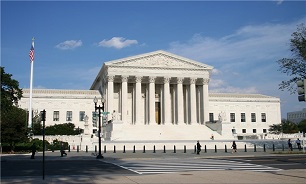The order, signed by conservative Justice Samuel Alito, left open the possibility that the justices could exclude the late-arriving ballots in a subsequent ruling, a move which Alito and at least two other conservative justices have previously signaled they may be inclined to take.
The number of affected ballots is believed to be between 3,000 and 4,000. Election law experts said that even if the justices were to later invalidate them, the only way this would impact the outcome of the race between US President Trump and Democratic nominee Joe Biden is if the election were decided by Pennsylvania and the pair were separated in the state by a very slim margin, The Hill reported.
Friday’s order was the first time the Supreme Court has gotten involved in a state count after Election Day. Alito urged Pennsylvania’s Democratic Secretary of State Kathy Boockvar, the respondent in the case, to file any response as soon as possible and no later than Saturday at 2 p.m.
The order granted only part of what was sought by Pennsylvania Republicans, who are challenging the state’s extended Friday mail ballot deadline. The state GOP requested justices halt the counting of late-arriving ballots.
“This preserves the status quo until any further order of the Court, after the possibility of a response,” said Ned Foley, a law professor at Ohio State University. “It’s also significant in that it does not stop the counting of the segregated votes, but rather requires them to be counted separately — which is a sensible way to prevent any possible commingling of ballots that could not be undone later.”
It was unclear how much of an impact the order might have on Pennsylvania election boards, who Boockvar had previously ordered to segregate and separately count late-arriving ballots.
Alito said the boards’ degree of compliance had not been confirmed by either party.
“Neither the (Pennsylvania Republican Party) nor the Secretary has been able to verify that all boards are complying with the Secretary’s guidance, which, it is alleged, is not legally binding on them,” he wrote.
The dispute over Pennsylvania’s relaxed mail ballot due date was one of several hundred lawsuits filed in the months leading up the election, and was among several that reached the Supreme Court.
A common theme emerged in the pre-election litigation: Democrats and their allies sought accommodations across the country for voters, like relaxed deadlines for the receipt of a record number of mail-in ballots amid the coronavirus pandemic and Postal Service delays. Republicans, for their part, tended to push for maintaining strict voting limits.
In late October, the justices denied the state GOP’s request to fast-track consideration of a Pennsylvania Supreme Court ruling that upheld the state’s mail ballot due date extension. Chief Justice John Roberts joined the court’s three liberals in denying the Republican bid.
But the three most conservative justices — Alito, Clarence Thomas and Neil Gorsuch — strongly suggested that they viewed the Pennsylvania state court as having encroached on the legislature’s constitutional authority over state elections.
The conservative trio also held open the possibility of taking up the GOP appeal after Election Day, which prompted Boockvar to issue the ballot-segregation guidance to election boards.
Justice Amy Coney Barrett, who joined the bench one day before the court denied the GOP’s motion to expedite, took no part in its consideration. She and Justice Brett Kavanaugh would likely hold the decisive votes if the court were to grant the Republican’s pending appeal, which requires the approval of at least four justices.
The Trump campaign on Thursday requested to be added as a party in support of the court’s grant of the GOP’s petition for appeal.

